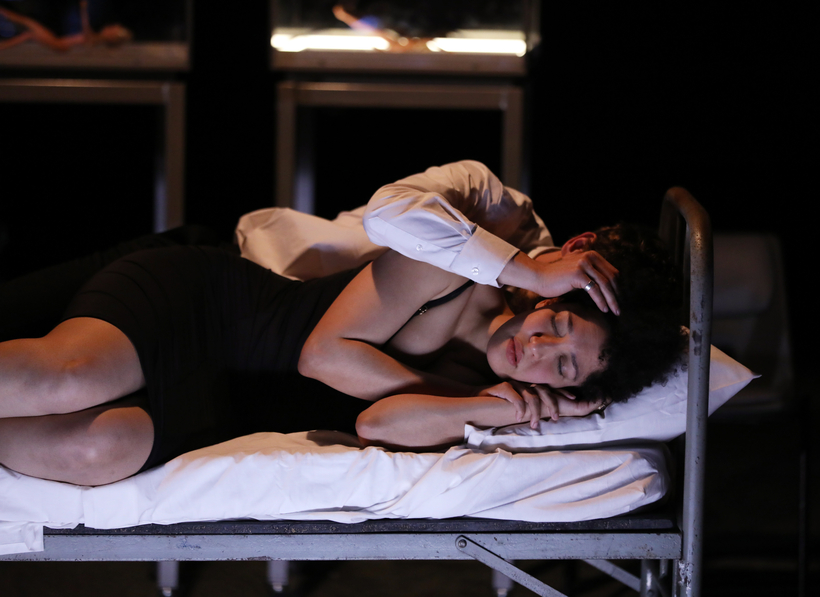The new theater piece Zauberland (Magic Land) comes trailing the descriptor, “An encounter with Schumann’s Dichterliebe.” Meaning what, exactly? Isn’t every performance of Robert Schumann’s 1840 song cycle an encounter? Yes, but not like this one. Slipped in among Schumann’s setting of 16 poems by the Romantic ironist Heinrich Heine are three ringers by Martin Crimp, a British playwright, that are set to music by the Belgian composer Bernard Foccroulle. When the expanded Dichterliebe concludes, a new 16-song cycle by Crimp and Foccroulle follows without a break. All in, the hybrid creation runs 75 minutes.
Julia Bullock, the soprano with whom Zauberland was developed, explains that Dichterliebe originally included four songs that Schumann’s editors suppressed. “So, Bernard and Martin felt comfortable inserting their own work into these places where Schumann’s songs were omitted, and I will say that the links are brilliant—one almost doesn’t gather that the cycle has changed modes for several seconds. The transitions returning to Schumann are often warm, but also reveal how modern some of Schumann’s songs are.”
Dichterliebe (A Poet’s Love) describes a textbook romantic triangle that ends badly for the narrator, who in the end picks up his marbles and defiantly moves on. The “magic land” he sings of is a world of happy fantasies that vanish with the dawn. Zauberland lends this irreality ominous contemporary and political overtones. Bullock describes the whole as “a dream sequence where a woman attempts to process a refugee journey from Syria and relocation in Cologne.” Why Cologne? Because Cologne, the river Rhine that runs through it, and the cathedral on the river’s bank, loom large in the Schumann material.
In other words, if compass points seem arbitrary, they aren’t—which is not to say that the riddles of the piece have any specific “right” answers. “Zauberland is not based on any one story, or reality,” Bullock says. “This anonymous dreaming woman could represent many people. She may be a classically trained singer from Syria who fled. She may be a person from Western Europe who has read about the unbelievably difficult and traumatic realities of those who have had to seek asylum elsewhere. It’s up to each individual watching to determine.”
Sharing the stage with Bullock are the pianist Cédric Tiberghien and a quartet of movement artists, whose roles are likewise open to the viewer’s interpretation. “The four others are shape shifters,” the singer says, “sometimes serving as a child, a lover, border guards, figures that haunt and torment. They are silent but essential. I depend on them.”
The production is the creation of Katie Mitchell, a director as controversial as she is bold. Bullock, who began her professional life in the theater at the knee of Peter Brook, guru supreme of postwar theater, and continued at the elbow of the Yoda-like Peter Sellars, shares a revealing vignette from the studio.
“On our third or fourth day of rehearsal,” Bullock recalls, “after I had presented a sequence with an actor and shared everything that I saw in my mind’s eye, Katie turned to her assistant and said, ‘Make a list of each of these items. We need to bring them into the room tomorrow.’ And I said, ‘No, no, Katie. We don’t need all those props. I can just imagine them.’ Katie very calmly—and she makes a point of remaining calm in the room—said, ‘But Julia, why wouldn’t we let the audience see what you see? And why wouldn’t you want to see what you have envisioned? The responsibility doesn’t have to rest fully on your shoulders. It shouldn’t.’”
Bullock remembers that she was nonplussed. “It hadn’t occurred to me,” she says, “that that was an option!” —Matthew Gurewitsch
This production travels to: Royal Opera House, London (October 15–18); UMS University of Michigan, Ann Arbor (October 24–25); Lincoln Center, New York (October 29–30); Opéra de Lille, Lille (December 6–7); La Monnaie/De Munt, Brussels (February 11–15); and Opéra de Rouen, Normandie (May 19–20).
